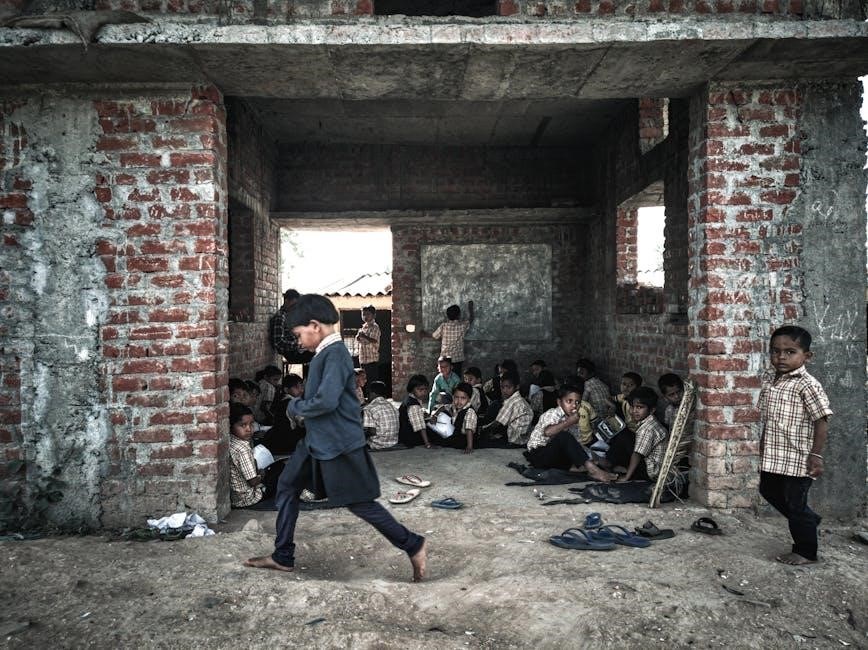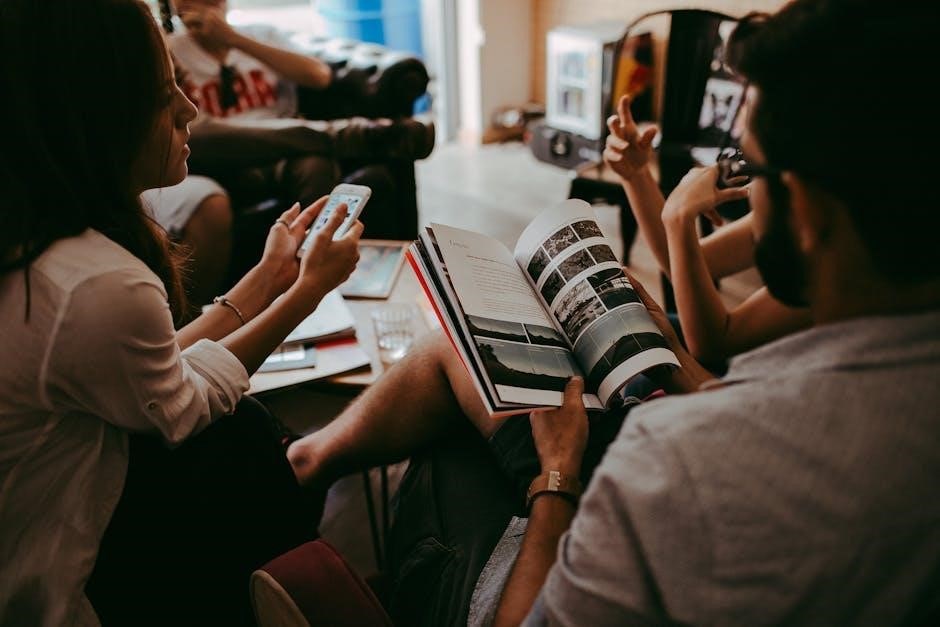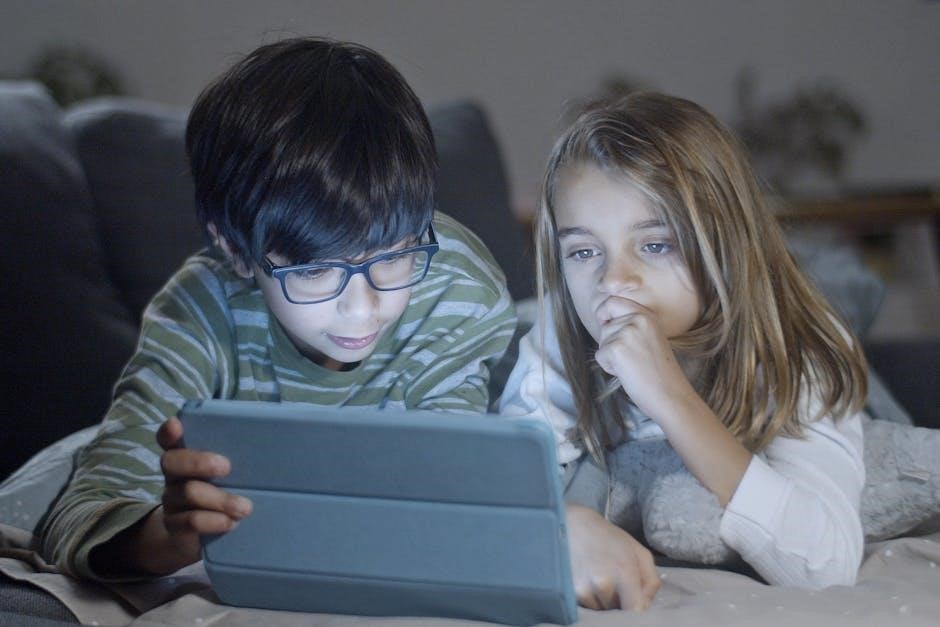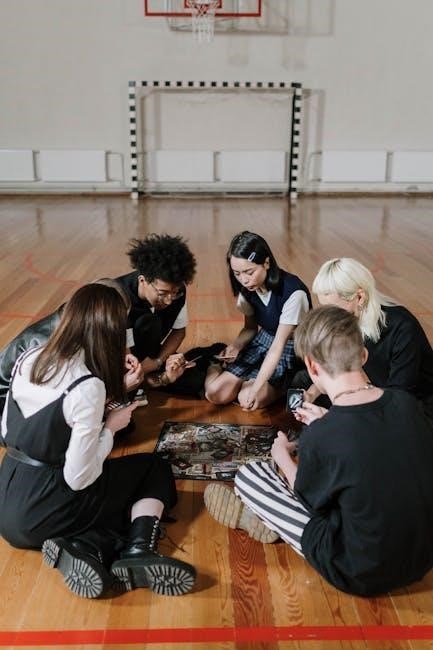Social Learning Theory, developed by Albert Bandura, emphasizes observation, imitation, and modeling in learning. It highlights the interplay between behavior, environment, and cognition, introducing reciprocal determinism.

1.1 Overview of Social Learning Theory

Social Learning Theory, developed by Albert Bandura, explains how individuals acquire new behaviors and knowledge by observing and imitating others. It extends beyond traditional behaviorist theories by incorporating cognitive processes, emphasizing that learning is not merely through reinforcement but also through observation and mental representation. The theory highlights the role of reciprocal determinism, where behavior, personal factors (e.g., cognition), and environmental influences interact bidirectionally. This approach acknowledges that people actively process information and construct their own understanding, making learning a dynamic and reciprocal process. Bandura’s work underscores the significance of role models and the environment in shaping behavior, offering a comprehensive framework for understanding human learning and development across various contexts.
1.2 Significance of Bandura’s Contribution to Psychology
Albert Bandura’s Social Learning Theory revolutionized psychology by bridging behaviorist and cognitive perspectives. He introduced the concept of reciprocal determinism, showing how behavior, cognition, and environment interact. Bandura’s work demonstrated that learning occurs through observation and imitation, not just reinforcement, expanding our understanding of human behavior. His theory has been widely applied in education, psychotherapy, and media studies, offering practical strategies for behavior change. Bandura’s contributions remain foundational in psychology, emphasizing the role of cognition and social processes in learning. His work continues to influence modern fields like sustainable development and digital learning, solidifying his legacy as a pioneer in psychological theory and application.
Key Concepts of Bandura’s Social Learning Theory
Bandura’s Social Learning Theory centers on observational learning, reciprocal determinism, and the role of cognition, emphasizing how behavior is shaped by observing and imitating models.

2.1 Observational Learning
Observational learning, a cornerstone of Bandura’s Social Learning Theory, posits that individuals acquire new behaviors by observing and imitating others. Unlike classical conditioning, it involves cognitive processes, as learners actively perceive, remember, and replicate actions. This concept challenges the idea that learning occurs solely through direct experience, emphasizing instead the role of models and their behaviors. The process involves four key steps: attention to the model, retention of the observed behavior, reproduction through practice, and motivation to perform the action. The effectiveness of observational learning depends on the model’s characteristics, such as status or similarity, and the consequences they receive. Bandura famously demonstrated this in his Bobo doll experiments, showing that children imitate aggressive behaviors when modeled. Observational learning highlights the profound impact of social interactions on behavior acquisition, making it a vital component of Bandura’s framework.
2.2 Reciprocal Determinism
Reciprocal determinism, a central concept in Bandura’s Social Learning Theory, describes the dynamic interplay between three factors: behavior, personal factors, and the environment. Unlike one-way causal models, Bandura’s theory emphasizes bidirectional influences. Behavior is shaped by personal factors, such as cognition and emotions, while these internal factors are also influenced by external environmental cues. Simultaneously, an individual’s actions can alter their environment, creating a continuous cycle of interaction. This concept underscores the complexity of human behavior, rejecting the idea of passive learning. Instead, it highlights active engagement, where individuals are both products and architects of their surroundings. Reciprocal determinism provides a holistic understanding of behavior, emphasizing the interconnectedness of personal, behavioral, and environmental elements in shaping human actions and development.

2.3 The Role of Cognition in Learning
Cognition plays a pivotal role in Bandura’s Social Learning Theory, emphasizing the mental processes that facilitate learning. Cognitive factors such as attention, memory, and expectations significantly influence what individuals observe and imitate. Bandura suggests that learners actively process information, selecting and interpreting behaviors based on their cognitive frameworks. Memory is crucial, as it enables the storage and retrieval of observed actions, allowing for later reproduction. Moreover, cognitive processes like self-regulation and self-efficacy shape an individual’s confidence in performing learned behaviors. This mental engagement highlights that learning is not merely passive but involves active cognitive participation. Thus, cognition not only enhances the understanding of observed behaviors but also determines how effectively they are replicated, underscoring its essential role in the learning process.
Core Components of Social Learning Theory
Social Learning Theory’s core components include attention, memory, motivation, and imitation, emphasizing how cognitive processes and environmental interactions shape behavior and learning outcomes effectively.
3.1 Attention in the Learning Process
Attention plays a crucial role in Bandura’s Social Learning Theory, as it determines what individuals notice and focus on in their environment. People selectively attend to certain stimuli based on their characteristics, such as novelty, complexity, or emotional appeal. For observational learning to occur, the learner must first pay attention to the model’s behavior and its consequences. Factors like the observer’s past experiences, preferences, and the model’s attractiveness or credibility influence attention. Without focused attention, even the most significant behaviors or events may go unnoticed, limiting learning opportunities. Thus, attention acts as a filter, ensuring that only relevant information is processed and stored for future use. This mechanism highlights the interplay between cognitive processes and environmental cues in shaping behavior.
3.2 Memory and Its Impact on Learning
Memory is a fundamental component of Bandura’s Social Learning Theory, as it enables individuals to retain and recall observed behaviors. Effective learning requires the ability to store information about modeled actions and their consequences. Memory ensures that observed behaviors are not forgotten, allowing for future imitation. Factors such as repetition, emotional significance, and reinforcement strengthen memory retention. Bandura emphasizes that without memory, learning through observation would be fleeting and ineffective. Memory also interacts with cognitive processes, enabling individuals to reflect on past experiences and apply them to new situations. This underscores the importance of memory in sustaining and generalizing learned behaviors across different contexts and over time.
3.3 Motivation and Reinforcement
Motivation plays a crucial role in Bandura’s Social Learning Theory, driving individuals to engage in observed behaviors. Reinforcement, whether positive or negative, significantly influences learning by providing feedback on the consequences of actions. Positive reinforcement encourages repetition of behaviors, while negative reinforcement or punishment discourages them. Bandura emphasizes that motivation is not merely innate but is shaped by external rewards and punishments. Reinforcement strengthens the association between behaviors and their outcomes, enhancing the likelihood of imitation. Moreover, vicarious reinforcement, where individuals observe others being rewarded or punished, further motivates behavior. This interplay between motivation and reinforcement highlights how external factors guide learning and behavior, making them central to the theory’s explanation of human behavior and development.
3.4 The Role of Imitation and Modeling
Imitation and modeling are central to Bandura’s Social Learning Theory, as they enable individuals to acquire new behaviors by observing and replicating others. Bandura demonstrated this through his famous Bobo doll experiment, where children imitated aggressive behaviors exhibited by adult models. The theory suggests that individuals learn by observing live models, symbolic models (e.g., in media), or verbal instructions. Modeling provides a template for behavior, while imitation involves reproducing those actions. The likelihood of imitation increases when models are perceived as similar, prestigious, or rewarded. Bandura also emphasized that imitation is not automatic; it requires attention, memory, and motivation. This process underscores how social interactions and observational experiences shape behavior, making modeling a powerful tool for learning and adaptation.

The Role of Environment in Social Learning
The environment significantly influences behavior by providing contexts for observation, reinforcement, and modeling. It interacts with personal factors, shaping learning through external stimuli and social interactions.
4.1 Environmental Influences on Behavior
The environment plays a crucial role in shaping behavior through observational learning and reinforcement. People learn by observing others in their surroundings, with the environment providing models for behavior. For instance, witnessing rewarded actions encourages imitation, while punished ones deter it. Environmental cues, such as social norms or physical settings, also influence behavior. Bandura’s theory highlights how external factors interact with personal traits, creating a dynamic interplay that drives learning and behavior. The availability of reinforcement or punishment in the environment significantly impacts whether observed behaviors are adopted or avoided. Thus, environmental influences are integral to the social learning process, shaping individual actions and decisions.
4.2 The Interaction Between Individual and Environment
In Bandura’s Social Learning Theory, the interaction between the individual and their environment is bidirectional and dynamic. Personal factors, such as cognitive processes and motivations, influence how individuals perceive and respond to environmental stimuli. Conversely, environmental cues, like social interactions or physical settings, shape behaviors and reinforce certain actions. This reciprocal relationship highlights the interdependence of personal and environmental elements. Bandura emphasizes that individuals are not passive recipients of environmental influences but actively interpret and respond to their surroundings. This dynamic interaction underscores the complexity of learning and behavior, where both the person and their environment play equally vital roles in shaping outcomes.

Applications of Social Learning Theory
Social Learning Theory applies to education, psychotherapy, and media, offering practical strategies for shaping behaviors and fostering positive change in various real-world contexts effectively.

5.1 Education and Learning Strategies
Social Learning Theory provides valuable insights for education, emphasizing the role of observation, imitation, and modeling in learning processes. Educators can use demonstrations, videos, and peer modeling to teach complex skills, fostering active participation. Bandura’s theory highlights the importance of reinforcement and feedback to motivate students, encouraging positive behavior and persistence. Additionally, creating environments where students observe and imitate successful behaviors can enhance learning outcomes. The theory also supports the use of cognitive strategies, such as self-regulation, where students set goals and monitor progress. By integrating these principles, educators can design engaging and effective learning strategies that cater to diverse learning styles and promote academic success. This approach aligns with modern educational goals, emphasizing active learning and skill development through observation and practice.
5.2 Psychotherapy and Behavior Change
Bandura’s Social Learning Theory offers practical applications in psychotherapy and behavior change. Therapists can use modeling techniques to demonstrate desired behaviors, helping clients learn through observation and imitation. Reinforcement strategies, such as positive reinforcement, can encourage adaptive behaviors, while reducing maladaptive ones. The theory also emphasizes the role of cognition, enabling individuals to self-regulate and reflect on their actions. Techniques like cognitive restructuring align with Bandura’s principles, helping clients modify thought patterns that drive problematic behaviors. Additionally, understanding the interaction between personal factors, behavior, and environment (reciprocal determinism) allows therapists to tailor interventions addressing these dynamics. This approach fosters lasting behavior change by empowering individuals with skills to manage their environments and thoughts effectively. It is widely applied in treating anxiety, phobias, and behavioral disorders, making it a versatile framework for psychotherapy.
5.3 Media Influence on Behavior
Bandura’s Social Learning Theory highlights the significant role of media in shaping behavior. Through observational learning, individuals acquire behaviors by watching models in media, such as television, movies, or video games. Media often portrays behaviors as rewarding or desirable, which can reinforce their adoption. For example, violent media can lead to imitative aggression, as observed in Bandura’s Bobo doll experiment. Additionally, media can influence cognitive processes, as individuals learn to associate certain actions with outcomes. The theory also suggests that repeated exposure to media content normalizes behaviors, making them appear acceptable. This underscores the dual potential of media: it can promote prosocial behaviors or unintentionally encourage harmful ones. Understanding media’s impact is crucial for harnessing its power to foster positive behavior change. Thus, media serves as a powerful tool in shaping societal norms and individual actions.
Criticisms and Limitations of the Theory
6.1 Critique of Observational Learning
Bandura’s Social Learning Theory, particularly observational learning, has faced criticism for its perceived oversimplification of human behavior. Critics argue that the theory places too much emphasis on observation and imitation, potentially neglecting the complexity of internal cognitive processes and biological influences. Some suggest that observational learning does not fully account for why individuals choose to imitate certain behaviors while disregarding others. Additionally, the theory’s reliance on controlled laboratory experiments, such as the Bobo doll study, has been criticized for lacking ecological validity, as real-world environments are far more dynamic and multifaceted. Lastly, the theory has been accused of underestimating the role of cultural and individual differences in shaping learning processes.

Future Directions and Implications
Future directions for Bandura’s theory include integrating technology in learning, addressing cultural diversity, and exploring applications in AI and policy development. Implications involve enhancing personalized learning strategies and ethical considerations in behavior modeling.
7.1 Expanding the Theory in Modern Contexts

Bandura’s Social Learning Theory can be expanded in modern contexts by incorporating digital platforms and artificial intelligence. Observational learning can be enhanced through virtual environments, allowing for personalized learning experiences. The theory can also address contemporary issues like sustainability and mental health by modeling pro-environmental behaviors and stress-coping strategies. Additionally, integrating cultural diversity into the framework can broaden its applicability across global populations. The rise of social media presents new avenues for studying how people learn and imitate behaviors online. Future research could explore the ethical implications of AI-driven modeling and its impact on human behavior. By adapting to these modern trends, Bandura’s theory remains relevant in addressing complex societal challenges and fostering positive behavioral change.

